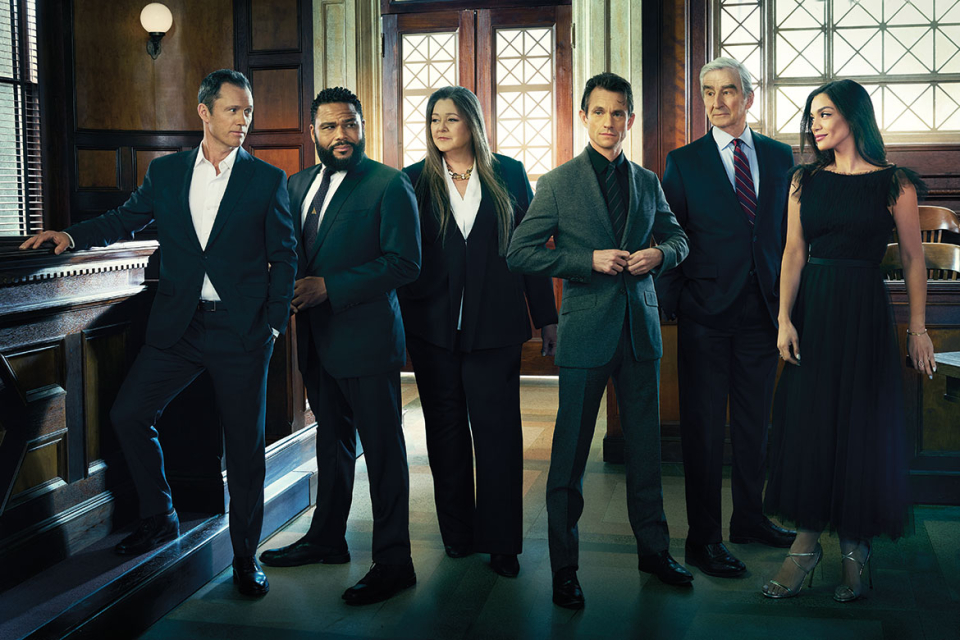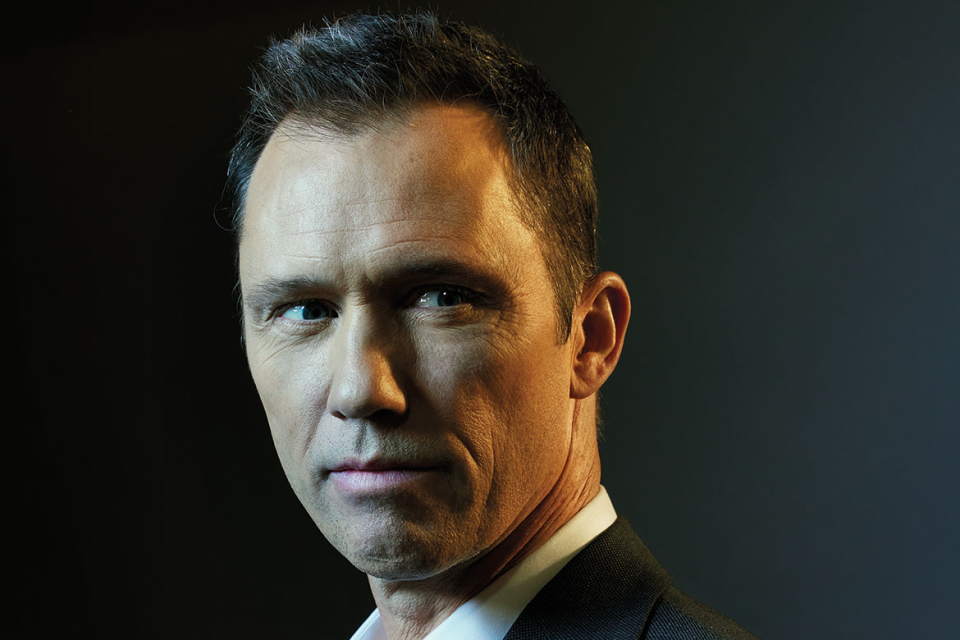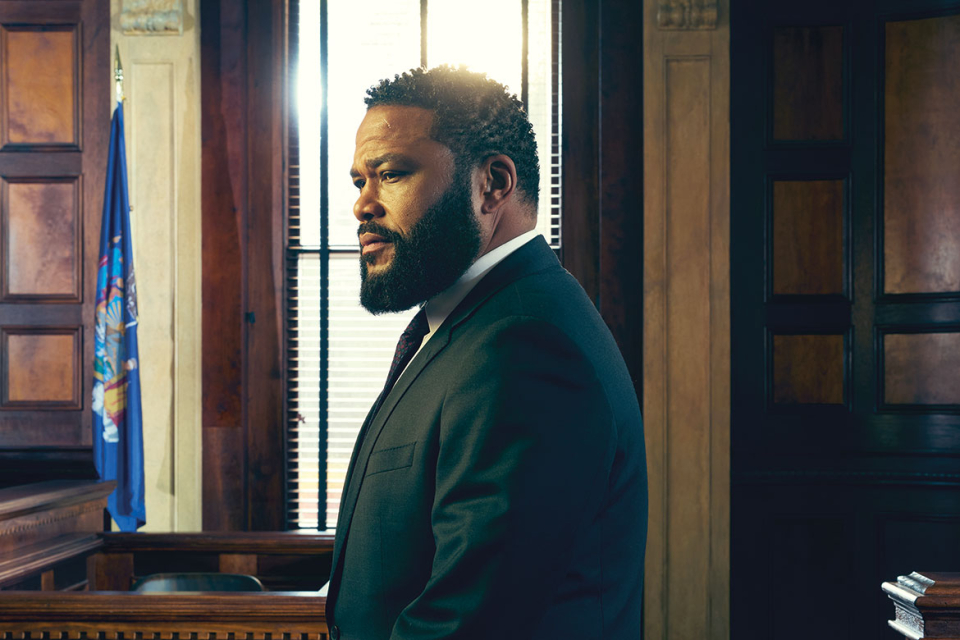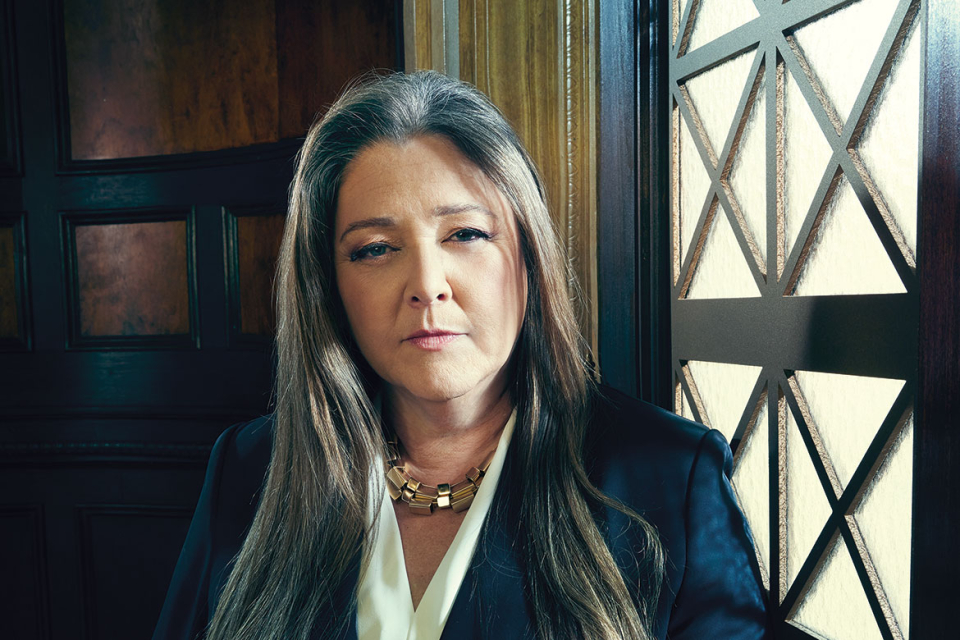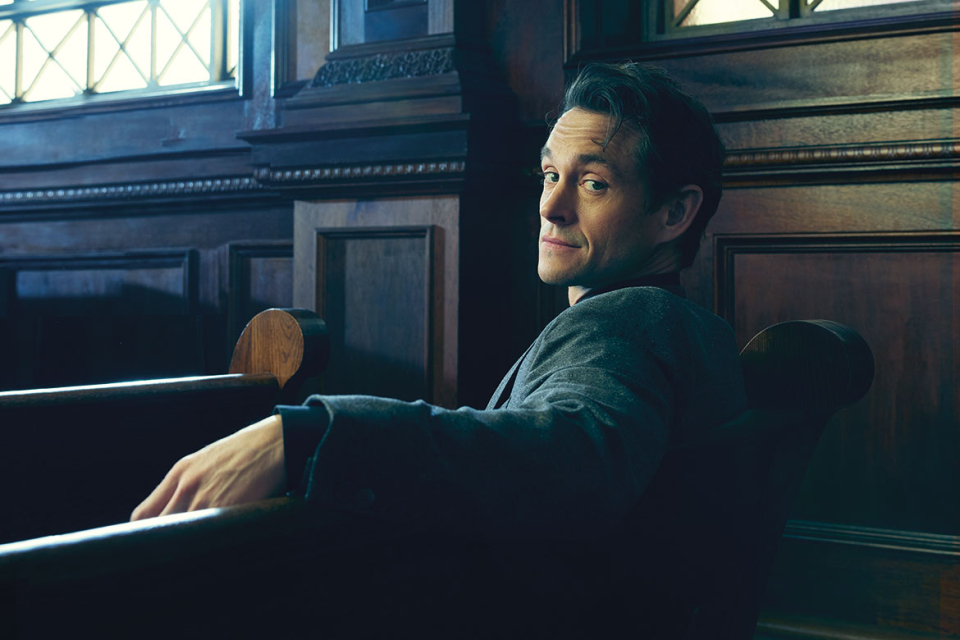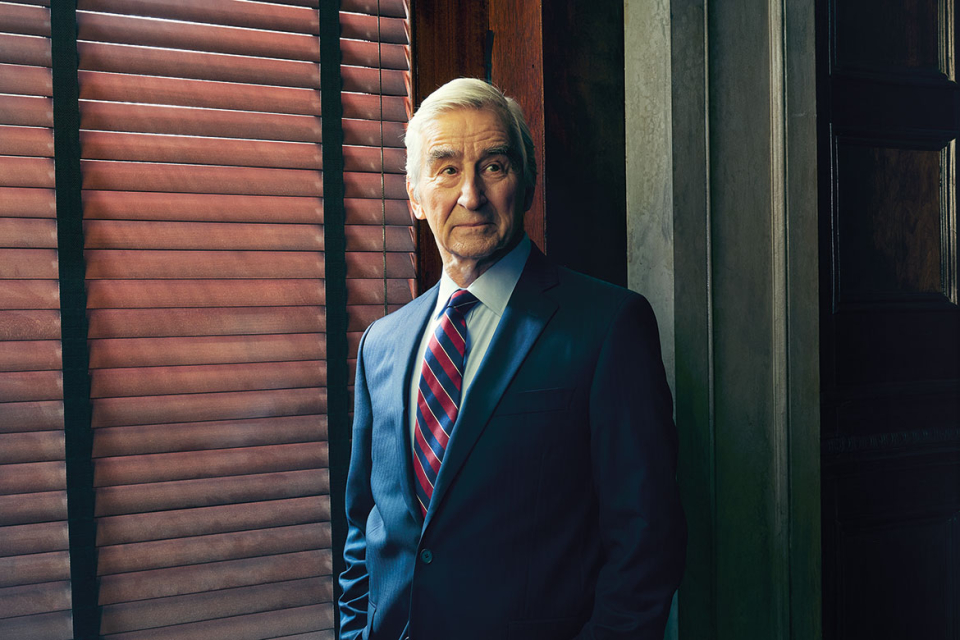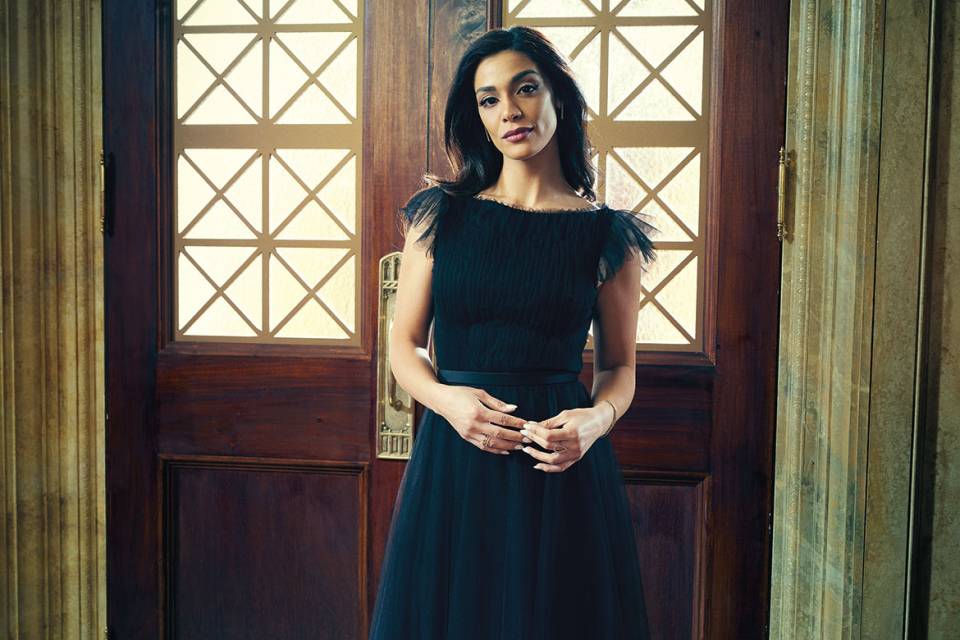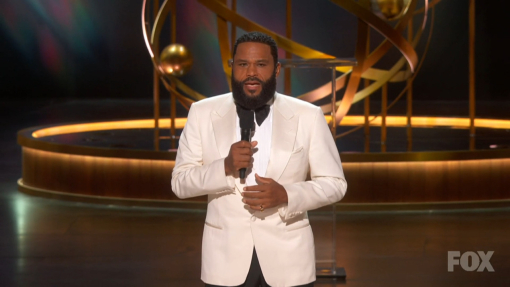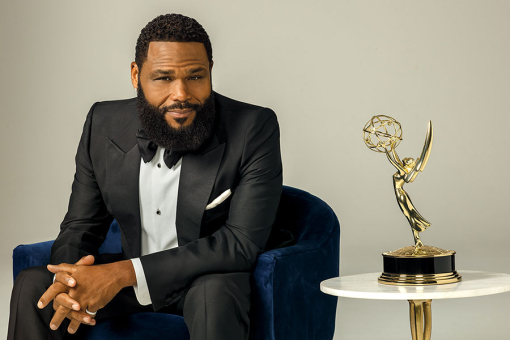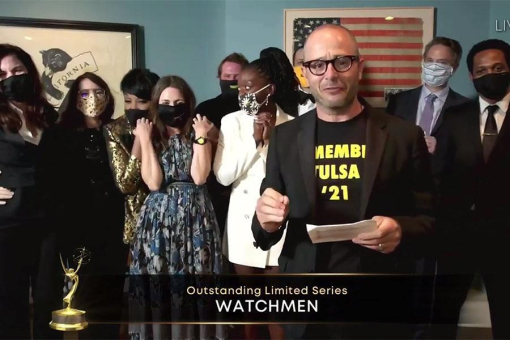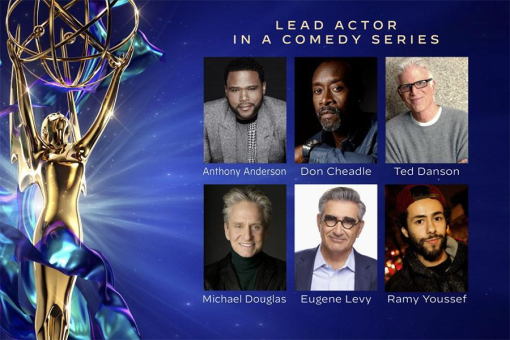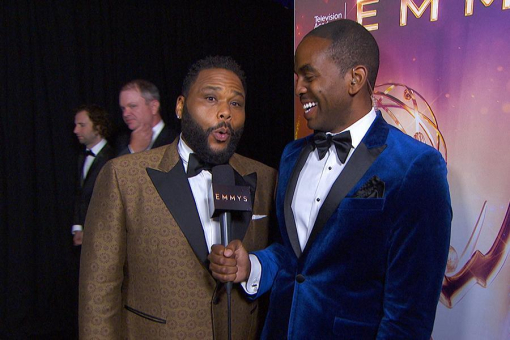In the criminal justice system, the people are represented by two separate, yet equally important groups — the police who investigate crime and the district attorneys who prosecute the offenders. These are their stories.
Guaranteed your brain just added the dun-dun sound effect.
That opening, though, is more than Pavlovian TV. Those two sentences launched the Law & Order dynasty, which has been running on NBC and basic cable in various iterations since 1990. The original, abruptly canceled in 2010, returned in February with ten new episodes.
Law & Order retains its familiar setup: a crime is committed (usually a homicide), police hunt for clues, nab the wrong suspect and eventually find the right perp; then prosecutors take over for the second half. Justice is meted out in an often messy process, but it's all tied up in a neat forty-four minutes. The perfect procedural.
And as long as there's crime, it stays timely.
"When I pitched the show to Brandon [Tartikoff, then president of NBC], he asked me, 'What is the bible for the series?'" creator and executive producer Dick Wolf recalls. "I said, 'The front page of the New York Post.' Our stories may often be ripped from the headlines; they reflect today's zeitgeist."
That zeitgeist includes how the NYPD has reacted to the racial reckoning of the past few years. Having just wrapped its twenty-first season and been renewed for its twenty-second, Law & Order remains relevant and (given its subject matter) oddly comforting.
"It's the same show, the same idea — just a different time," says showrunner, executive producer and writer Rick Eid. "The world's changed. The idea of the show really hasn't."
Dozens of other canceled shows have resurfaced over the years. This, however, isn't a reboot. It's something far more novel — a continuation. This latest season presents what would have happened had the show stayed on the air and become television's longest-running drama (it nonetheless stands as the second-longest-running).
"No matter what else I have or will accomplish, nothing will surpass creating the two longest-running scripted [live-action] series in the history of television," Wolf says, referencing Law & Order and Law & Order: SVU, which just wrapped season twenty-three.
During the original run of Law & Order, detectives and prosecutors cycled through — as they do in real life. However, like Manhattan District Attorney Robert Morgenthau, who served in that post from 1975 to 2009, Jack McCoy (Sam Waterston) has held office for decades. Waterston not only met the legendary lawyer, he has a Yankees cap signed by the late prosecutor.
Walking back onto the set — struck from its original home on the Chelsea Piers in Manhattan and now in Long Island City, Queens — was emotional for Waterston and Anthony Anderson, the two returning cast members.
"It made the hair stand up on the back of your neck," Waterston says. "It was really something very, very special. They recreated the old sets exactly as they had been before, right down to the books on the shelves and the linoleum on the floor. It's a little bit like the world's most expensive episode of This Is Your Life — that NBC would have gone to all this trouble just to make time travel possible for Anthony Anderson and myself. "
When the veteran stage actor signed on, he wasn't gambling on a TV show. For most of the previous years, Waterston had signed one-year contracts. "It made it possible for me to feel, which was worth it, that I was a free man," he says. "I mean, who knew that it was going to last that long?"
The show's focus has always been on the crime, not the professionals seeking justice. Still, loyal viewers gleaned that McCoy was the son of a tough New York City cop. He was a devotee of the Clash, Scotch and motorcycles. In his first episode, McCoy casually changed from his suit pants into jeans — in his office in front of A.D.A. Claire Kincaid (Jill Hennessy).
"Holy smokes, why wasn't I arrested?" Waterston says with a chuckle, and then acknowledges that sort of office behavior wouldn't fly today.
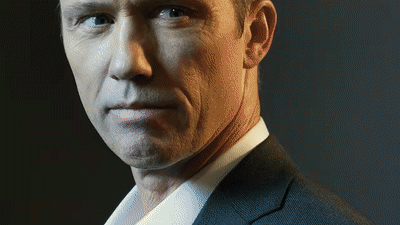
Law & Order has always reflected reality, mirroring what subways, streets, cops and killers look like at the time. "It tries to be real, and it tries to be honest," Eid says. "It's a window into what it's like to be a cop, a prosecutor, a defendant. It's not a documentary, but I feel like there's an honesty to it."
And while the series has never been political, it is topical, which means some viewers will agree with an approach and others will be infuriated, particularly in these fragmented times.
"We don't preach; we don't tell people what to think," Eid explains. "We let people decide. As Dick says, you know you have a good episode when half the audience throws their shoe at the television for one reason and the other half throws it at the TV for the other reason."
Regardless of the reactions it provokes, the show is believable, from the old lady observing her block through the bars on her first-floor window to the twitchy junkie outside the bodega.
Anderson's character, Detective Kevin Bernard, deals with people on the street. But as a former member of Internal Affairs, he was, for a while, the ultimate outsider — other cops didn't trust him. Yet Bernard has consistently proved himself a moral anchor.
"We always look at Sam [Waterston] as the OG, and in this new incarnation, the OG is back," Anderson says. "But I am now an OG with Sam. So it's kind of crazy to walk around town and see me front and center [on ads] at bus stops. It's pretty crazy, and it's pretty cool at the same time."
Also cool: the show's ongoing efforts to reflect contemporary society. "The way policing has changed in real life is how we're changing it in real time on our show," Anderson says. "We've all had to shift, given the climate. Bernard has just evolved in his patience, his understanding and his compassion."
While Anderson has played a cop before, he draws on his personal experiences of being arrested and, he says evenly, beaten by police. A nineteen-year-old sophomore at Howard University, he was protesting a Ku Klux Klan rally in Washington, D.C., when the incident occurred.
"I understand people's outcry, their anger and their frustration, because I have been a victim of police brutality," he says. "Fortunately, I'm here to talk about it. Was I a hot-headed kid at that time? Yes, I was. Did I deserve to be beaten, stomped and kicked by nine police officers? No, I didn't. And I believe it's my constitutional right to be wherever I can be to voice my opinion, whether you agree with it or not."
Anderson says he is friends with cops, which helps inform Bernard, a calming presence, especially juxtaposed against his new partner. Hot-headed Detective Frank Cosgrove (played by Jeffrey Donovan) skates close to being a racist, and his backstory includes an investigation for assaulting a young Black suspect. Bernard believes Cosgrove committed the assault, Anderson says, but there wasn't enough evidence to warrant charges.
What's Donovan's opinion? "I don't think that Frank is a racist, and I don't think he believes he's a racist," the actor says of his character. "I believe he fights really hard against stereotypes, but he also is a cop who has a blue uniform and a gold badge, and he says, 'I got to follow the facts to where the facts lead me.'"
When the season opened, Cosgrove was primed for a fight, angry that people were always recording video on their phones as soon as police arrived at a scene.
"That gave rise to a conversation between the partners about the way the world is now with phones, the sensitivities to police reform, the Black Lives Matter movement," Eid notes. "We're trying to have the conversations on the show that a lot of people are afraid to have in real life. The show reflects society and the law, and race is central to both at the moment — I feel it would be a disservice to ignore it."
Another sign of the times is how Executive Assistant D.A. Nolan Price (Hugh Dancy) approaches his job — he's more collaborative than McCoy. Like his colleagues, Dancy loves working with Waterston, and he asked the veteran for some specific advice: what to do in the case of extras in the jury box who snooze during filming.
"I thought, if he says, 'That never happened to me,' I really will not feel good about myself," Dancy recalls. "But he said, 'It used to happen all the time. I would ask them not to.' That was helpful, because nobody wants to be acting to a sleeping human being — although it wouldn't be the first time in my life," he adds, jokingly.
Like most of his Law & Order costars — and many of the show's guest stars — Dancy has worked on Broadway. For years, a fun intermission game has been paging through Playbill, searching for the New York City actor without a Law & Order credit. Waterston suggests that the Tony Awards bestow an honor on Wolf for employing so many stage actors.
Landing a Law & Order guest spot was a career goal for Donovan and Camryn Manheim, who plays his precinct boss. She follows S. Epatha Merkerson, the longest-tenured cast member, as lieutenant of the detectives.
When Manheim signed on to play Lieutenant Kate Dixon — who is respected by the men who answer to her — she planned to contact Merkerson. The actresses had known each other for years, but Manheim waited. When Merkerson texted her out of the blue, Manheim asked her about playing Anita Van Buren.
"She said, 'You're going to love the show. It was the best seventeen years of my life!'" Manheim reports.
Unbidden, three members of the ensemble volunteer what huge fans they were — long before they were cast. Donovan offers, "This is without guile: I am probably the biggest fan among the cast. I watched it when it came out in 1991. I was at NYU, and it was appointment television." And Manheim reveals that when she was an NYU drama student, she considered Law & Order her master class.
For newcomer Odelya Halevi, the location was different, but not the love. She grew up in Israel, watching the show with her mother, and wanted to be a lawyer because of it. But mom realized her daughter loved the show as an actress.
Halevi immigrated to the U.S. fourteen years ago, speaking little English, but before long she was picking up roles. When she heard she'd landed the part of A.D.A. Samantha Maroun, she was at a friend's baby shower. "I started shaking, like something bad happened," Halevi says. When she shared the news with her friend, with whom she'd taken acting classes, "We both started crying and hugging."
In one episode, Maroun relates in court that her sister was raped. Such details contribute to the series' timeliness, reflecting how today, even in formal settings, people tend to share more.
Indeed, times have changed. Used to be, the show was full of white, wisecracking, world-weary cops. They sometimes fell into Damon Runyon-esque dialog, toots, in the city that never sleeps. And no one did it better than the late, great Jerry Orbach, who played Sky Masterson in Guys and Dolls decades before becoming Detective Lennie Briscoe.
Orbach remains one of those people folks can't mention without smiling — even seventeen years after his death. He's one reason the repeats of Law & Order remain so popular in syndication. Even if those older episodes are dated by the Twin Towers, clunky cars and phone booths, the formula works.
There's also a satisfying comfort to seeing bad guys get caught and punished — it's why viewers continue to watch. Many argue that Law & Order should never have gone off the air. "I was shocked that the show was inexplicably canceled," Wolf writes via email. "I have five kids, and the one thing each has had drilled into their heads — never, ever, ever, ever give up."
Most of those fortunate to be cast in season twenty-one have no intention of giving up. The actors — save Waterston, who at eighty-one likes those one-year deals — maintain they'd return indefinitely. (At press time, Anderson announced he was not coming back to the show.)
"I want this to be a big chunk in my life," Manheim says. "I was living in Los Angeles, and when this happened, I was like, 'I would like to have a new adventure. I want to reacquaint myself with New York and go back and teach at NYU and be a part of this legacy that means so much to me.' When my agent came back with [an offer of] a chunk of years, I was like, 'Bring it on! I'm in!' I'm here for the long haul."
And just as Wolf predicted, the New York Post continues to spark plotlines. Eid begins his day reading tabloids to "find the story within the story."
"A salacious headline? Great!" he says. "How do you make it interesting? What's our take on it? What's the spin? What's the dilemma? What's the issue? You know, it's about the story within the story. Otherwise, what's the point? You want to take people on a ride and make people think and throw their shoes at the television."
Besides Dick Wolf and Rick Eid, the executive producers of Law & Order include Arthur W. Forney and Peter Jankowski. The series is produced by Wolf Entertainment and Universal Television, a division of Universal Studio Group. Season twenty-one of Law & Order is available on NBC.com and Peacock.
This article originally appeared in emmy magazine issue #7, 2022, under the title, "Poetic Justice."

